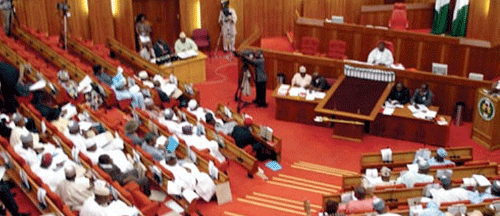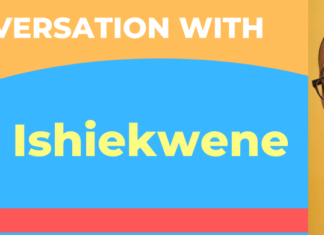By Emeka Alex Duru
Apparently concerned at agitations and counter-reactions by different ethnic groups in the country over the flawed federal system, the Senate has requested the Presidency to forward another copy of the 2014 National Conference Report to it for full deliberation.
Though the directive is not known to have been implemented by the Presidency, there are hopes that the move by the lawmakers, will go a long way in calming frayed nerves in the country.
Tension mounts
Since the largely successful May 30 sit-at-home organised by the Indigenous Peoples of Biafra (IPOB) in remembrance of the Igbo lost in the various upheavals in the country before, during and after the 1967-1970 civil war, events in the country, have taken turns for the unpredictable.
Seen in some quarters, especially in the North, as veiled call to arm or gradual move at secession by the Igbo, the sit-at-home exercise has evoked reactions that, have, in several ways, further laid bare Nigeria’s fault lines.
Youths from the North, have, for instance, in obviously panicky manner, fired back at what they considered IPOB audacity, ordering the Igbo living in their zone to quit the area on or before October 1.
The quit notice which attracted wholesale condemnation from well-meaning Nigerians from different sections of the country, is yet to be conclusively addressed. For example, socio-political organisations from the Yoruba of the South West and their counterparts from the Middle Belt, Niger Delta, have expressed readiness to exit the country, if the Igbo are forced out of the North. The Middle Belt, has particularly warned that in the event of other regions pulling out the country, they would not tag along with the North.
Central at the regime of suspicion among the component parts of the country is the allegation of its lopsided structure. Each group has in one way or another, accused the other of holding it down or working against its interest. While the accusations last, Nigerians live in mutual suspicion of one another while the stunted development of the country, becomes the immediate result.
Jonathan shows the way
It was against the background of this intense dissatisfaction with the political structure of the country that the immediate past President Goodluck Jonathan administration set up the National Conference chaired by retired Chief Justice Idris Legbo Kutigi on March 17, 2014.
The former President had, while setting up the body, recalled that for many years, Nigerians had craved to talk on how the different components of the country could co-exist on a mutually-acceptable term.
The desire, he stated, was borne out of the fact that the 1914 amalgamation of the Northern and Southern Protectorates to form Nigeria, did not have the input of the people, hence the mutual distrust that has often threatened the nation’s unity.
Although the mandate of the Confab was not far-reaching enough, the 492 delegates assembled in Abuja, soon made it clear through their arguments, disagreements and objections and subsequent consensus that they meant business. Their pragmatic approach to and part-resolution of the national question and ancillary matters gave a ray of hope and reduced tension in the country.
Haunted by the past
Even at that, there was grave concern by informed analysts on what would happen to the outcome of the deliberations at the end of the day.
The fear, incidentally, stemmed from past experiences. In 1994 for instance, the administration of late General Sani Abacha had contrived a Constitution Conference to discuss the Nigeria Project and strengthen the perceived grey areas of the 1979 Constitution.
Curiously, Abacha restricted the delegates to the confab from discussing the twin issues of Nigeria’s unity and her federal arrangement.
Even then, while the administration expended fortunes in organising the debate, it was clear to informed analysts that there were no genuine intentions by the conveners to discuss the real issues confronting the nation.
In the process, the very issues that had led to earlier agitations for sovereign national conference, were utterly scaled down or out rightly skipped from the agenda.
The preceding General Ibrahim Babangida administration had sent Nigerians on similar wild goose chase, aimed at deceiving them.
But perhaps, the most bizarre of the contraptions was the former President Olusegun Obasanjo’s Political Reform Conference, which the government claimed was mandated to “reassess, refocus, redefine and redesign (the country’s) political landscape in a direction that would strengthen the bonds of unity, enhance the processes of democratic consolidation, and strengthen the structures so as to solidify those values that promote democracy, good governance and good neighbourliness.”
Coming under a civilian dispensation, though after initial reluctance from Obasanjo, the conference held and the talks went on for as long as it lasted. But at the end of the day, it was not better than the Abacha experience.
By the time the talk shop was disbanded in hazy circumstances, nothing of substance was achieved at the forum. In fact, there were insinuations that Obasanjo merely put up the body as a strategy in going about his ill-fated tenure elongation project.
It was against this background that apprehensive Nigerians had insisted that the outcome of the 2014 conference be subjected to a referendum. In what was seen as a move towards that direction, the Jonathan administration forwarded the resolutions of the Confab to the Senate one week to the expiration of the Seventh National Assembly in 2015.
Problems within
That, however appeared to be where the problems of the exercise commenced. There were, instant insinuations that resolutions of the conference might not be implemented given that there was no provision for referendum in the 1999 Constitution.
Some lawyers had then argued that amending the constitution to insert referendum into it, would be difficult because apart from the National Assembly assenting to the amendment by 2/3 vote, the Bill had to go to the 36 State Houses of Assembly for at least 2/3 of them to return a yes vote to the amendment. Many saw the attainment as an uphill task.
In addition, the open declaration by President Muhammadu Buhari, on coming to office, that he had no faith in the Conference Report, also weighed heavily against the exercise.
Gains of Confab Report
But with the current move at reopening discussions on the Report, there could be hope at the end of the day. This is especially considering what experts identify as the many salutary aspects of the document.
It is observed for example, that the Report, recommended a gradual introduction and implementation of measures to strengthen the faith of the citizenry in the amended constitution and the federation.
Analysts believe that this recommendation, will address the issues which centre on restructuring the country to give more powers to the constituent parts of the federation and in the process, douse the tension that has gripped the polity, lately.
Nwabueze offers insight
Even, some learned minds have argued that the National Assembly can make law allowing for referendum. Professor Ben Nwabueze, a foremost authority in Constitutional Law, had, for example, in an earlier encounter with our correspondent, stressed that National Assembly can make a law allowing for referendum. He said “You cannot have a referendum without a law authorising it. Is the National Assembly saying that they don’t have the power to make the law authorising a referendum? It is not true. They have all the power. They have power to make a law authorising a referendum”.
How far can the Senate go?
This may be the reason behind the request on the Presidency by the lawmakers to forward the chamber with another copy of the report. But will the Presidency which had expressed disdainful attitude to the Conference do so? And it fails, would NASS compel it to do so? These may be the questions of the day.
- Advertisement -
- Advertisement -











